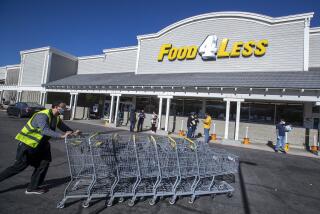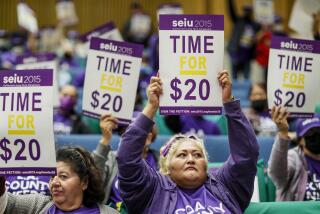Grocery strike probably averted; contract includes pay raises, pension bump

The looming threat of a grocery store strike throughout Southern California appeared to be dissolving Monday as workers began voting on a new employment contract that seemed to appease all parties.
Ralphs, Vons, Pavilions and Albertsons workers are voting through Wednesday on the deal brokered over the weekend between the supermarket chains and the United Food and Commercial Workers union. Roughly 47,000 members of seven union chapters across Southern California and parts of Central California are eligible to vote on the three-year contract.
Worker sentiment appears strongly positive on the deal, which includes bumps in wages, healthcare benefits and pension contributions.
“This is the best contract I’ve seen in 20 years,” said San Diego grocery clerk Jesús Ortega, who voted Monday morning.
The proposed contract outlines hourly wage increases for workers totaling $1.55 to $1.65 over the next three years, depending on the position. Workers also would get more money from their employers for pensions and healthcare. “For every hour of work, the company pays money into a trust fund,” said Todd Walters, the president of San Diego County’s UFCW local. “It’s kind of like an extension of their pay.” Under the proposed contract, workers should see an additional 40 cents per hour toward healthcare and 45 cents per hour for pensions over the next three years.
Walters said this contract was exceedingly good for workers compared with previous deals. Union members have been working under a contract that expired March 3. Last month, union leaders told the grocery chains that this week, workers would vote on whatever the companies were offering.
“In the past, we focused on pensions and healthcare but gave up on pay raises,” Walters said. “But our members have fallen behind on wages. Sometimes they have to work two to three jobs to survive.”
Ralphs spokesman John Votava, in an emailed statement, said of the agreement: “We are pleased to secure increased wages, continued premium healthcare coverage and pension stability. Our associates are the heart of our company and this agreement is a reflection of their contributions.”
Current hourly wages for workers, from general merchandise and meat clerks to department managers, range from $12.20 to more than $21. In areas that have a higher minimum wage than California’s $12-an-hour baseline — for example, in the city of Los Angeles and unincorporated areas of L.A. County, where the minimum at large employers is $14.25 an hour — the low end of the range goes up.
Burt Flickinger, managing director of retail consulting firm Strategic Resource Group, said scoring a wage increase and a bump in pension contributions is a victory for workers. Pensions across the nation are not growing at a good rate, he said, so extra money for their retirement fund was a lifeline.
He added that investors in the grocery chains shouldn’t be too worried about the concessions. Raises and benefits help with worker productivity and retention — something he said is needed with low unemployment and competition for workers from nonunion shops such as Target. And averting a strike would help the grocery chains. The same chains lost market share when their Southern and Central California workers went on strike in 2003.
“It’s a victory for everybody in the bargaining room,” Flickinger said.
The new pact follows months of negotiations between the union and the companies: Ralphs, which is a division of Kroger Co., and Albertsons Cos., which owns Vons and Pavilions. In June, workers voted to authorize union leaders to call a strike.
Walters said there was a moment last week when he expected the union members to go on strike against Ralphs. But ultimately, an agreement was reached. Negotiations stretched into the early hours of Sunday morning, and by 6 a.m. all parties had agreed on the proposed contract.
Southern California’s last grocery strike began in 2003, when nearly 60,000 workers walked off the job for more than four months. It was the largest and longest supermarket strike in U.S. history. In 2011, the union came close to striking, but after marathon negotiations, supermarkets and union leaders reached a deal.
Ortega, the grocery clerk who was around during the 2003 strike, said the workers felt more empowered this time. The economy is strong and jobs are plentiful.
“This time we would have had everybody,” Ortega said. “Things could have turned ugly. And in the end, who’s going to lose more? The company. Not us.”
Victor Rodriguez, who has worked in various roles at Ralphs since 1988, said he was ready to strike but is happy to avoid it.
“Nobody wants to do that,” Rodriguez said. “Last time, people lost their homes and couldn’t pay their bills.... But if you don’t fight for what is right, then the corporations are just going to keep winning.”
More to Read
Inside the business of entertainment
The Wide Shot brings you news, analysis and insights on everything from streaming wars to production — and what it all means for the future.
You may occasionally receive promotional content from the Los Angeles Times.








